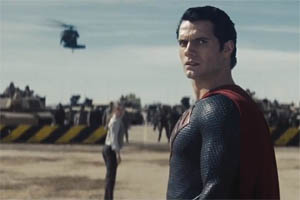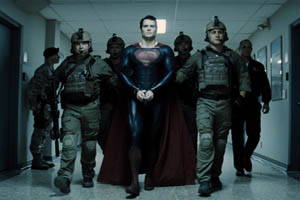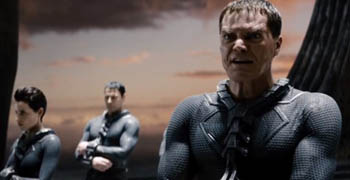|
The first Superman film to be absent the word "Superman" in its title just might be the best Superman film ever made. This sounds like a greater compliment than it truly is. The 1979 Richard Donner film was a landmark in its day, boasting impressive effects for the time and finding an almost perfect Superman in Christopher Reeve, though it struggled to take itself seriously once the villains arrived on the scene. Superman II amped the camp and totally failed to sell arch-villain General Zod as a serious global threat in either existing cut, and the next two sequels are best forgotten. Aside from a lukewarm attempt at restarting the franchise with 2006's Superman Returns, the world's most famous superhero has largely failed to make his mark in today's comic-book-adaptation-infested multiplexes as compared to Batman, Spider-Man, and more recently, the Avengers. With the cinematic Batman's savior Chris Nolan on as producer and comic geek Zack Synder directing, it seemed as if Warner Bros. was finally ready to make a serious mark with DC Comics' favorite son. Still, it looks as though neither Batman nor Marvel's stable need worry about abdicating top spot in the hearts of modern filmgoers just yet. Perhaps it's for the best that the film was not called Superman; it's a bit closer to Pretty-Darn-Okay Man. 
Nearly everyone in the western world knows the story: fearing the imminent destruction of planet Krypton, an advanced culture unfortunately ruled by space Republicans and climate-change deniers who doubt the inconvenient truth that their planet is about to break in half right up until it does, a lone scientist sends his son Kal-El to Earth in a rocket so that he might escape the doom that awaits the rest of his race. Earth's differing environment causes the child to develop extraordinary abilities far beyond those of mortal men. His father's old enemy, the aforementioned General Zod, follows him to Earth in hopes of establishing a new homeland, threatening the world with calamity if Kal-El, now named Clark Kent, does not surrender. Doubtlessly due to Nolan's influence, the story eschews the typical linear narrative and instead intercuts young Clark's childhood with his later years, using the editorial form to contrast significant events from his youth with the choices he now faces. Superman's trademark decency and overwhelming power make him a tricky character in terms of inner or external conflict, and the film introduces into the mix a modern perspective on such events-would we really welcome amongst us a being upon whom no checks could be made, simply trusting in his decency? Would we not have legitimate reason to fear such a man? Superman himself sums up the dilemma to a high-ranking military officer: "You fear me because you can't control me. And you never will." He goes on to make assurances of peaceful intent, but we the audience are only assuaged by our familiarity with the character. Those within the story lack such perspective, illustrating the underlying dilemma: should our protagonist be Superman at all, or merely remain in hiding as Clark Kent? His formative years have left him confused as to his path, as his father has cautioned him never to reveal his abilities, yet, in a pivotal scene, himself throws caution to the wind to save the family dog, an act which makes me like Pa Kent rather a lot. Decency and altruism are built into Clark; he can neither intervene nor sit idly by without, either way, rejecting the teachings of his father. 
Those familiar with Zack Snyder's standard directing style will be surprised to see little trace of his previous approach here. His mechanical, individual composition-heavy look is replaced with a loose, Spielberg-by-way-of-handheld approach, with nary a shot where everything grinds into slo-mo and then erupts back to full speed. And as per the more recent (read: successful) crop of superhero films to grace the screen, the story here is about finding the man inside the myth. Superman is one of the first ever superheroes, and one of the most simply drawn: he's good and he's powerful. A nice combo in reality, but less advantageous in fiction. Who can personally relate to being, as his father bluntly puts it, a god among men? Unfortunately, the attempts to deal with that subject are the film's clunkiest parts, as far too many obvious Jesus parallels are drawn in the tired and false assumption that religion equals depth and decency. Clark is advised to "make a leap of faith," while a villain cites the virtues of an amoral mindset and attributes it to evolution; it's ham-handed pandering to Bible Belt loons and is frankly beneath this film's dignity (for the umpteenth time, evolution describes a fact of reality and nothing more-no one expects general relativity or germ theory to come with a code of moral conduct attached). Frankly, Superman is better than Jesus; neither are real, but can you imagine Superman saying, "for turning to the false idol Batman to save your skin, depart from me, ye cursed, into the everlasting Phantom Zone, prepared for the devil Zod and his followers?" No, me either. What we consider a moral leader has advanced in the last two millennia, so let's quit extolling the supposed virtues of the past. 
I'll be honest: I have no particular nostalgic attachment to Superman. I've seen the films and the cartoons and the old George Reeves TV series, but it's just one of thousands of cultural markers. I don't care that Superman doesn't have red boxers or that there's no Kryptonite, or that Lois Lane knows damn well who he is. Frankly, most of the changes are welcome. I don't think his final decision regarding Zod harms his character-it's far more approval-worthy than, say, his ultimate handling of the same character in Superman II, which was frankly a bit fascist. I do think there needed to be more than a few scattered scenes of Superman saving bystanders; he spends too much time fighting the big fight, important that it might be, and not enough on the personal touch that makes Superman so likeable (it would probably be pretty hard for the shell-shocked survivors of Metropolis to realize quite so easily just how much they owed Superman in light of the damage done). But there's much to recommend it. It has by far the best Superman fight of any existing film, it allows humans to fight alongside Superman and actually contribute instead of being the perennially useless onlookers we've seen before, and it has that nano-tech puppet theater scene wherein Jor-El explains Krypton's history (up to and including a nod to the 1979 film in the form of Kal-El's escape ship). I don't even care that it seems unlikely to be any kind of technology that any real species would bother developing; it's a great combination of the theater of old with the theater of now, and it's beautiful. -review by Matt Murray
|
|
||||||||